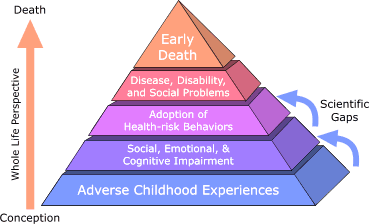SEARCH:
FOLLOW ME:
SUBSCRIBE TO MY BLOG:
THE ACE STUDY

The Adverse Childhood Experiences (ACE) Study showed that for 17,337 patients, childhood trauma correlated to serious adult medical conditions. “Contrary to conventional belief," says co-Director Vincent Felitti, MD, "time does not heal all wounds, since humans convert traumatic emotional experiences in childhood into organic disease later in life.”FEATURED BOOKS – QUOTES
"Too many Americans are spurred to achieve, rather than to attach."
--A General Theory of Love "Trying to fix the heart using the head, is like trying to paint with a hammer - it only makes a mess."
"You can be strong - or you can be human." -- Grief Recovery Handbook "Gosh, I shoulda checked the milligramage! Oh, well, Live and Learn." -- Working Girl "Any book you haven't thrown across the room at least once because it smashed your world view, probably isn't worth a long shelf life." -- Kathy "Mental health. For everything else there's MasterCard." -- Kathy-
RECENT POSTS
- Singing for Joy after Trauma: My Music Video! May 17, 2018
- Parenting as We Were Parented May 10, 2018
- I had a blast: “Mary Giuliani LIVE!” Apr 18 April 17, 2018
- My Book’s Amazon Reviews: Music & Healing April 3, 2018
- Six-City Bus Tour: Campaign to Heal Childhood Trauma March 23, 2018
RECENT COMMENTS
- Paula Kinghorn on Featured Topics
- Saria bushmire on Find a Support Group
- whoiscall on Singing for Joy after Trauma: My Music Video!
- deen on Blogs
- Lin Rhodes on Featured Topics
ARCHIVES
Category Archives: Attachment Disorder
Dreaming of a Safe America – Laura Kerr
This guest blog by Dr. Laura Kerr, PhD, Stanford University, really struck me. For Americans as people, and our government, she notes, “unconscious dreams and unresolved traumas influence our defensive reactions to threat, much like the child that suffers chronic … Continue reading →
![]()
Posted in Attachment, Attachment Disorder, Attachment Theory, Trauma
|
Tagged Adult Attachment Disorder, Adult Attachment Theory, Adverse Childhood Experiences, Buddhism, Child Abuse, Dissociation, Globalization, insecure attachment, Intergenerational Trauma Transmission, Sensorimotor Psychotherapy, Social Trauma, Somatic Experiencing, Trauma Denial
|
1 Comment
Stephen Porges on Treating Trauma and Compassion
Dr. Stephen Porges discovered in 1994 that trauma in humans comes from our most ancient “reptilian” freeze reflex. He calls it the Polyvagal Theory, as I wrote last week. But Porges also says we can use our mammalian attachment system … Continue reading →
![]()
Posted in Attachment Disorder, Attachment Theory, Brain Science, Dissociation
|
Tagged Adult Attachment Disorder, Adult Attachment Interview, Adult Attachment Theory, brain science, Brain stem, Dissociation, Fight/Flight, Mammalian Attachment, Medical Trauma, Polyvagal Theory, Stephen Porges
|
1 Comment
Polyvagal Theory: Trauma as Reptilian Freeze
CLICK to BUY “Don’t Try This Alone” Neuroscientist Dr. Stephen Porges appeared in my last few blogs; let’s explore his 1994 discovery of the Polyvagal Theory. Dr. Porges runs brain-body research at top psychiatry departments (University of Chicago and University … Continue reading →
![]()
Posted in Attachment, Attachment Disorder, Attachment Theory, Brain Science, Dissociation
|
Tagged Adult Attachment Disorder, Adult Attachment Interview, Adult Attachment Theory, brain science, Brain stem, Dissociation, Fight/Flight, Mammalian Attachment, Polyvagal Theory, Reptilian Brain, Stephen Porges
|
9 Comments
“General Theory of Love” on Mammals
“A General Theory of Love” by Thomas Lewis MD, Fari Amini, MD, and Richard Lannon, MD, is all about why it’s so important that we are mammals. They say it’s vital that we value our mammalian attachment system and stay … Continue reading →
![]()
Posted in Attachment, Attachment Disorder, Attachment Theory, Brain Science
|
Tagged Adult Attachment Disorder, Adult Attachment Interview, Adult Attachment Theory, brain science, Brain stem, Emotional pain, Fari Amini, Frontal Cortex, Limbic brain, Mammalian Attachment, Reptilian Brain, Richard Lannon, Thomas Lewis
|
Leave a comment
Mammalian Attachment System Heals Trauma
Dr. Stephen Porges writes in his groundbreaking “Polyvagal Theory” that mammals like us aren’t made for trauma. We’re made primarily to attach to other mammals, which makes us feel safe, secure and good. When that fails, we’re also made to … Continue reading →
![]()
Is Our Medical System Traumatizing Us?
Hey, it happens to us all. I’m healthy as a horse, but a body part was bugging me, so at my annual check up I asked to see a specialist. I love my family doc, er I mean “primary care,” … Continue reading →
![]()
Pediatricians Screen for Child Trauma
“To prevent childhood trauma, pediatricians screen children and their parents…and sometimes, just parents…for childhood trauma” — guest blog by Jane Ellen Stevens, Editor, ACEsTooHigh.com and ACEsConnection.com When parents bring their four-month-olds to a well-baby checkup at the Children’s Clinic in Portland, … Continue reading →
![]()
Dan Siegel: Creating a Joyful Brain
I’ve got some great short videos here by Dr. Dan Siegel, MD — and even his friend comedienne Goldie Hawn makes an appearance. I’ve also had a lot of demand for my book — but it’s not done. I’ve been … Continue reading →
![]()
Posted in Attachment, Attachment Disorder, Attachment Theory, Brain Science, Dissociation
|
Tagged Adult Attachment Disorder, Adult Attachment Interview, Adult Attachment Theory, brain science, Brain stem, Daniel Siegel, Developmental Trauma, Dissociation, Frontal Cortex, Limbic brain, Mindfulness, Neuroplasticity, Secure Attachment
|
Leave a comment
Dissociation Nation: Half a Brain
Dan Siegel’s webinar “How Mindfulness Can Change the Wiring of Our Brains,” which I found by accident in March 2011, insisted that we can re-wire our brains. Siegel actually used neuroplasticity and “mindsight” (see July 11 blog) to re-wire the brain … Continue reading →
![]()
Dan Siegel: Re-Wire Your Brain
Like I say, Dr. Dan Siegel introduced me to brain science, and I write about brain scientists like him ‘cos they saved my life. It was all an accident… or a God-send. In August 2010 I heard psychologist Dr. Henry … Continue reading →
![]()

